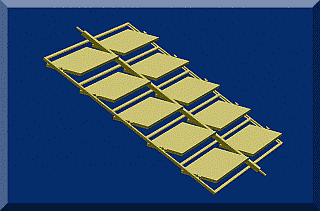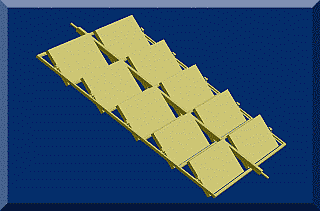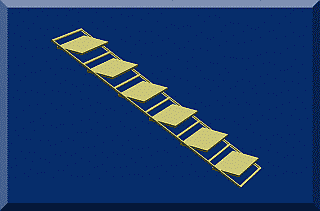Usually the start of a project is accompanied by wild enthusiasm for
exotic solutions. In this case I gradually settled in on a more
practical implementation.
|
|
| Here is a concept drawing of my idea
for a single-axis solar tracker that is manually adjustable for
declination. The inspiration
for this concept occurred at Home Depot as we
looked at mini-blinds.
The design is a polar tracker, meaning that its rotation
is about an axis that is parallel to the earth's rotational axis. The tracker's axle must be oriented true north/south and tilted to the location's latitude
angle. Declination is
accommodated by an independent adjustment. In this way the tracker will
optimally follow both azimuth and elevation angles with only a single
tracking axis.
|

Tracking - Summer Solstice
|
Polar tracking is a common technique for tracking celestial
objects. When applied to photovoltaic arrays, however, the axle tilt is often compromised from
a latitude match or is seasonally adjusted for declination. The
penalty for this is non-optimal tracking of the solar path.
Actually this concept has two axes of movement, but the elevation axis needn't
change much from day to day and nearly perfect tracking is
obtained with four adjustments per year.
|

Tracking - Winter Solstice
|
| I decided against tracking due to its mechanical complexity and the
amount of spacing needed between arrays to avoid shading. Still hoping to capture as much solar energy as
possible and practical I extended the declination adjustment feature
of my tracker design to a fixed array. Here's a concept drawing
showing one bay
with panels adjusted for normal incidence at summer-solstice noon.
The individual panels must be spaced along the frame length to avoid mutual shading near the solstice
periods. This spacing is minimized if the frame is tilted at the
latitude angle, however it can be set to any angle if greater spacing
can be tolerated.
Finally, after going through these exercises, another concept came to
mind. It became the final design. |

Fixed - Summer Solstice
|